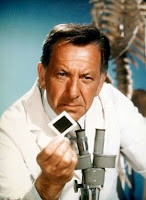A Writer's Quick-fix Toolkit

In an ideal world we'd have a lifetime to work on each one of our stories and reading some of the writing advice that's out there, most commentators seem to think that's exactly what we've got. Sure, we'd love to spend forever making it perfect, but some of us have jobs, dependants, mortgages and maybe even deadlines.
But what can you do when the end is near (be it the end of writing time, the looming deadline, or simply the yawning grave) and your story's still horrendous?
Well providing you have enough critical distance to know what's wrong, here are some quick fixes that will at least move your work from the truly atrocious to the somewhat tolerable.
Sluggish Pace
Five minutes of hell is better than five days of it – which is something to bear in mind when writing a story. Even if your work is truly appalling, if it zips along nicely it won't appear so bad as if it's as sluggish as hell.
So how do we create pace? True pace is created by rapidly moving events told in an economical and engaging way. But this takes time and skill to perfect, so what can we do when our backs are against the wall? Simple – keep it short – short sentences, short paragraphs, short everything. A load of white space on the right will make a quicker and therefore pacier read. And if the reader can think 'ok, it's bad, but at least I can finish it before lunch, and you never know, it may actually get better' you're one step closer to greatness.
Unconvincing Characters
Chances are you've thrown everything into your main character and everyone else is a plank. Or maybe your MC is a plank too - a story-world of planks. So what can you do when you need to inject a little believability into your characters? Imagine what you would do if you were that character in that situation. It will be far more convincing than the current unmotivated action, and you never know, you may discover your characters in the process.
Nothing Happening
Six years of effort and you've found yourself with 900 pages of internal monologue where nothing actually happens. Ouch. And some agent has just requested the full manuscript. Double ouch. So how can you quickly get a story when you've got nothing? Motivate the MC by either giving them something they want (or something they don't want i.e. a situation to get out of) and then make them attempt to get it in the most direct and obvious way. Then stop them. Then get the MC to make the next obvious and shortest route. Then stop them doing that. Keep doing it and before you know it, you've got a plot. It's quick, it's dirty, it's better than nothing.
Utterly Uninvolving
This will probably be due to a combination of the above things, but if you've managed to get some moderately convincing characters, a workable plot and reasonable pace and it still reads like a funeral durge, then it's got to be down to story-telling technique.
So what can you do if you're the worst story-teller ever? Don't despair – there's a fix for that too – and it involves extricating yourself as much as possible from the text. Eliminate all authorial flourishes, narrative summary, directorial explanations, metaphors and similes. Aim to tell your story as clearly and straightforwardly as possible and let your characters speak for themselves.
And the good thing about that is, if it's still abominable, it will all be their fault.


'if the reader can think 'ok, it's bad, but at least I can finish it before lunch, and you never know, it may actually get better' you're one step closer to greatness.'
ReplyDeleteROFL. Words to live by. Thank God for writing plot-driven MG, this may be all I have going for my current WIP.
@Girl Friday - A strong plot is always a great place to start - for me, you can't go wrong if the story is great. It's a perfect foundation for writing - anything over and above that is a bonus. Thanks for your comment and I'm glad I made you laugh. I originally envisaged this as a serious post, but clearly find it hard to take myself that seriously!
ReplyDeleteHa ha! I loved your last line. I agree, a great premise will make up for all sorts of flaws in craft. Where great craft doesn't always make up for a lame premise.
ReplyDelete@Laura - thanks, Laura. Loved your last blog-post btw - tweeted it to all the world - or my small slice of it anyway.
ReplyDeleteJames, too funny "... but if you've managed to get some moderately convincing characters, a workable plot and reasonable pace and it still reads like a funeral durge ... " It happens. I haven't committed a full-durge, but have come pretty close. I end up writing loads that gets cut because a) I've lost focus of the story and b) how the scene I'm writing fits in to what my main character wants to accomplish. If my head's not in the clouds or I'm not tired as hell when I sit to write, I do okay, provided I keep "a" and "b" top-of-mind. Great post.
ReplyDelete@Ezzy - thanks Ezzy, and great to hear from you again. I know the tired as hell feeling - that pretty much sums up my general writing state - would like to think that means I can tap into a dream-like writing quality, but in reality it means I write the words created by my head slumping against the keyboard!
ReplyDeleteGreat tips there. I've done the rewrite to death thing. My tendency is to write for the sake of getting the words out then going back and cutting them all out again.The best bit is when your character suddenly does its own thing and you find yourself writing them doing stuff you'd never planned for them.
ReplyDeleteThanks for commenting, Hayley and apologies for the late response. I like to think that the more we write the better we get and the less rewriting we have to do. Also some ideas feel good right from the start, while others need to be worked a lot harder. What do you think?
ReplyDelete